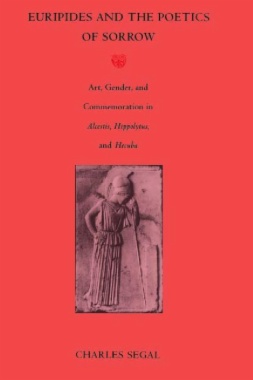Where is the pleasure in tragedy? This question, how suffering and sorrow become the stuff of aesthetic delight, is at the center of Charles Segal's new book, which collects and expands his recent explorations of Euripides' art.
Alcestis, Hippolytus, and Hecuba, the three early plays interpreted here, are linked by common themes of violence, death, lamentation and mourning, and by their implicit definitions of male and female roles. Segal shows how these plays draw on ancient traditions of poetic and ritual commemoration, particularly epic song, and at the same time refashion these traditions into new forms. In place of the epic muse of martial glory, Euripides, Segal argues, evokes a muse of sorrows who transforms the suffering of individuals into a "common grief for all the citizens," a community of shared feeling in the theater.
Like his predecessors in tragedy, Euripides believes death, more than any other event, exposes the deepest truth of human nature. Segal examines the revealing final moments in Alcestis, Hippolytus, and Hecuba, and discusses the playwright's use of these deaths--especially those of women--to question traditional values and the familiar definitions of male heroism. Focusing on gender, the affective dimension of tragedy, and ritual mourning and commemoration, Segal develops and extends his earlier work on Greek drama. The result deepens our understanding of Euripides' art and of tragedy itself.
- Contents
- Preface
- 1. Introduction
- 2. Euripides’ Muse of Sorrows and the Artifice of Tragic Pleasure
- Alcestis
- 3. Cold Delight: Art, Death, and Transgression of Genre
- 4. Female Death and Male Tears
- 5. Admetus’ Divided House: Spatial Dichotomies and Gender Roles
- Hippolytus
- 6. Language, Signs, and Gender
- 7. Theater, Ritual, and Commemoration
- 8. Confusion and Concealment: Vision, Hope, and Tragic Knowledge
- Hecuba
- 9. Golden Armor and Servile Robes: Heroism and Metamorphosis
- 10. Violence and the Other: Greek, Female, and Barbarian
- 11. Law and Universals
- 12. The Problem of the Gods
- 13. Conclusion: Euripides’ Songs of Sorrow
- Notes
- Bibliography
- Index

